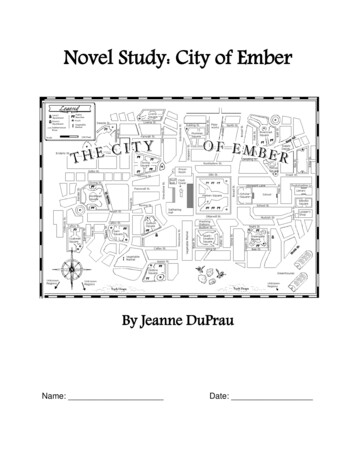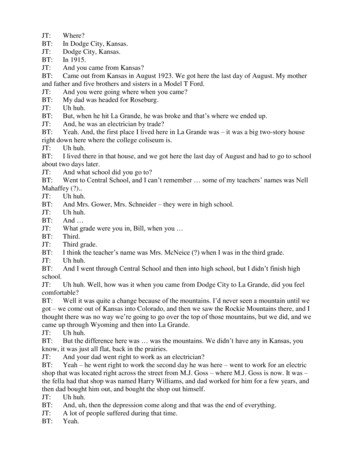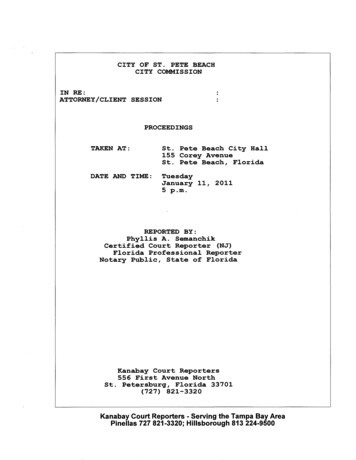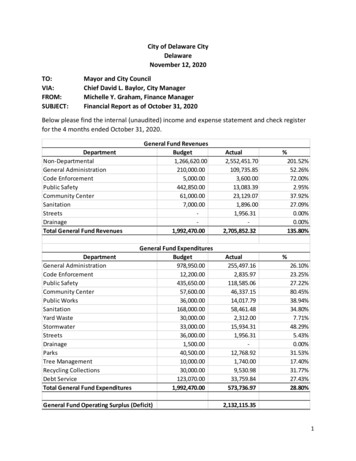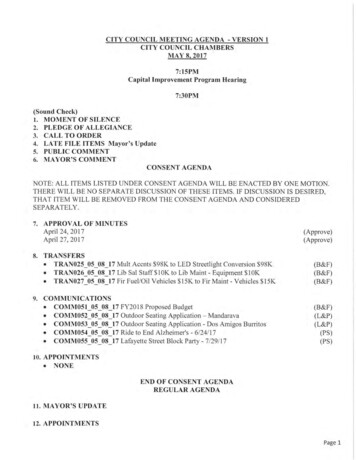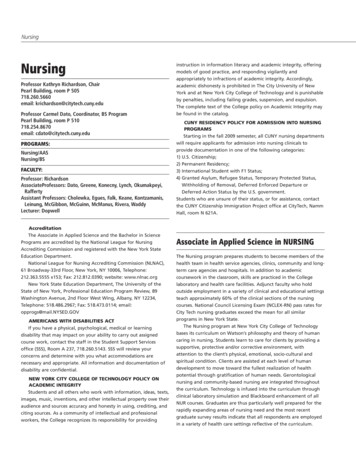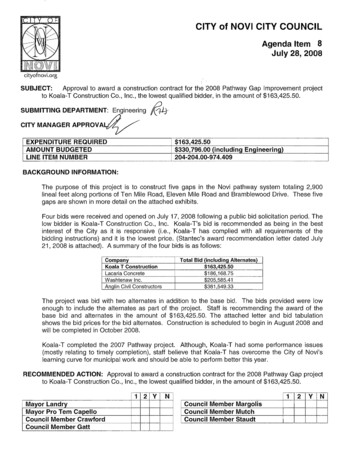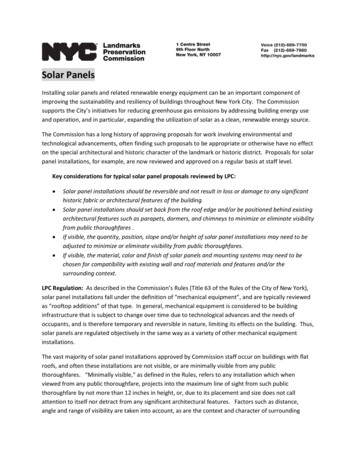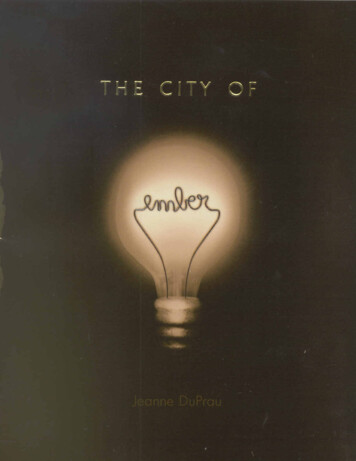
Transcription
Since 1966, Yearling has been theleading name in classic and award-winningliterature for young readers.With a wide variety of titles,Yearling paperbacks entertain, inspire,and encourage a love of reading.VISITWWW.RANDOMHOUSE.COM/KIDSTO FIND THE PERFECT BOOK, PLAY GAMES,AND MEET FAVORITE AUTHORS!
THE BOOKS OF EMBER:THE PEOPLE OF SPARKSTHE PROPHET OF YONWOODTHE DIAMOND OF DARKHOLD
Published by Y earling, an imprint of Random House Children’s Books a division of Random House, Inc., New Y orkThis is a work of fiction. Names, characters, places, and incidents either are the product of the author’s imagination orare used fictitiously. Any resemblance to actual persons, living or dead, events, or locales is entirely coincidental.Text copyright 2003 by Jeanne DuPrauPhotographs TM & 2008 by Walden Media, LLCMap by Chris RielyExcerpt from The People of Sparks copyright 2004 by Jeanne DuPrau Published by Random House Books for Y oungReadersAll rights reserved. No part of this book may be reproduced or transmitted in any form or by any means, electronic ormechanical, including photocopying, recording, or by any information storage and retrieval system, without the writtenpermission of the publisher, except where permitted by law. For information address Random House Books for Y oungReaders.Y earling and the jumping horse design are registered trademarks of Random House, Inc.Investigate the world of Ember at www.booksofember.comVisit us on the Web! www.randomhouse.com/kidsEducators and librarians, for a variety of teaching tools, visit us at www.randomhouse.com/teachersThe Library of Congress has cataloged the hardcover edition of this work as follows:DuPrau, Jeanne.The city of Ember / by Jeanne DuPrau.p. cm.Summary: In the year 241, twelve-year-old Lina trades jobs on Assignment Day to be a messenger, to run to new placesin her beloved but decaying city, perhaps even to glimpse Unknown Regions. ISBN: 978-0-375-82273-5 (trade)—ISBN:978-0-375-92274-9 (lib. bdg.)—ISBN: 978-0-375-82274-2 (pbk.) [1. Fantasy.] I. Title. PZ7.D927 Ci 2003 [Fic]—dc21 2002010239ISBN: 978-0-385-73628-2 (pbk.)eBook ISBN 9780375890802Reprinted by arrangement with Random House Books for Y oung ReadersRandom House Children’s Books supports the First Amendment and celebrates the right to read.v4.1 r1a
ContentsCoverOther Books by This SeriesTitle PageCopyrightMapThe Instructions1. Assignment Day2. A Message to the Mayor3. Under Ember4. Something Lost, Nothing Found5. On Night Street6. The Box in the Closet7. A Message Full of Holes8. Explorations9. The Door in the Roped-Off Tunnel10. Blue Sky and Goodbye11. Lizzie's Groceries12. A Dreadful Discovery13. Deciphering the Message14. The Way Out15. A Desperate Run16. The Singing17. Away18. Where the River Goes19. A World of Light20. The Last MessageAcknowledgments
Excerpt from The People of Sparks
Detail left
Detail right
The InstructionsWhen the city of Ember was just built and not yet inhabited, the chief builder and theassistant builder, both of them weary, sat down to speak of the future.“They must not leave the city for at least two hundred years,” said the chief builder. “Orperhaps two hundred and twenty.”“Is that long enough?” asked his assistant.“It should be. We can’t know for sure.”“And when the time comes,” said the assistant, “how will they know what to do?”“We’ll provide them with instructions, of course,” the chief builder replied.“But who will keep the instructions? Who can we trust to keep them safe and secret allthat time?”“The mayor of the city will keep the instructions,” said the chief builder. “We’ll putthem in a box with a timed lock, set to open on the proper date.”“And will we tell the mayor what’s in the box?” the assistant asked.“No, just that it’s information they won’t need and must not see until the box opens ofits own accord.”“So the first mayor will pass the box to the next mayor, and that one to the next, and soon down through the years, all of them keeping it secret, all that time?”“What else can we do?” asked the chief builder. “Nothing about this endeavor is certain.There may be no one left in the city by then or no safe place for them to come back to.”So the first mayor of Ember was given the box, told to guard it carefully, and solemnlysworn to secrecy. When she grew old, and her time as mayor was up, she explained aboutthe box to her successor, who also kept the secret carefully, as did the next mayor. Thingswent as planned for many years. But the seventh mayor of Ember was less honorablethan the ones who’d come before him, and more desperate. He was ill—he had thecoughing sickness that was common in the city then—and he thought the box might holda secret that would save his life. He took it from its hiding place in the basement of theGathering Hall and brought it home with him, where he attacked it with a hammer.But his strength was failing by then. All he managed to do was dent the lid a little. And
before he could return the box to its official hiding place or tell his successor about it, hedied. The box ended up at the back of a closet, shoved behind some old bags and bundles.There it sat, unnoticed, year after year, until its time arrived, and the lock quietly clickedopen.
CHAPTER 1Assignment DayIn the city of Ember, the sky was always dark. The only light came from great flood lampsmounted on the buildings and at the tops of poles in the middle of the larger squares.When the lights were on, they cast a yellowish glow over the streets; people walking bythrew long shadows that shortened and then stretched out again. When the lights wereoff, as they were between nine at night and six in the morning, the city was so dark thatpeople might as well have been wearing blindfolds.Sometimes darkness fell in the middle of the day. The city of Ember was old, andeverything in it, including the power lines, was in need of repair. So now and then thelights would flicker and go out. These were terrible moments for the people of Ember. Asthey came to a halt in the middle of the street or stood stock-still in their houses, afraid tomove in the utter blackness, they were reminded of something they preferred not to thinkabout: that someday the lights of the city might go out and never come back on.But most of the time life proceeded as it always had. Grown people did their work, andyounger people, until they reached the age of twelve, went to school. On the last day oftheir final year, which was called Assignment Day, they were given jobs to do.The graduating students occupied Room 8 of the Ember School. On Assignment Day ofthe year 241, this classroom, usually noisy first thing in the morning, was completelysilent. All twenty-four students sat upright and still at the desks they had grown too bigfor. They were waiting.The desks were arranged in four rows of six, one behind the other. In the last row sat aslender girl named Lina Mayfleet. She was winding a strand of her long, dark hair aroundher finger, winding and unwinding it again and again. Sometimes she plucked at a threadon her ragged cape or bent over to pull on her socks, which were loose and tended to slidedown around her ankles. One of her feet tapped the floor softly.In the second row was a boy named Doon Harrow. He sat with his shoulders hunched,his eyes squeezed shut in concentration, and his hands clasped tightly together. His hairlooked rumpled, as if he hadn’t combed it for a while. He had dark, thick eyebrows, which
made him look serious at the best of times and, when he was anxious or angry, cametogether to form a straight line across his forehead. His brown corduroy jacket was so oldthat its ridges had flattened out.Both the girl and the boy were making urgent wishes. Doon’s wish was very specific. Herepeated it over and over again, his lips moving slightly, as if he could make it come trueby saying it a thousand times. Lina was making her wish in pictures rather than in words.In her mind’s eye, she saw herself running through the streets of the city in a red jacket.She made this picture as bright and real as she could.Lina looked up and gazed around the schoolroom. She said a silent goodbye toeverything that had been familiar for so long. Goodbye to the map of the city of Ember inits scarred wooden frame and the cabinet whose shelves held The Book of Numbers, TheBook of Letters, and The Book of the City of Ember. Goodbye to the cabinet drawerslabeled “New Paper” and “Old Paper.” Goodbye to the three electric lights in the ceilingthat seemed always, no matter where you sat, to cast the shadow of your head over thepage you were writing on. And goodbye to their teacher, Miss Thorn, who had finished herLast Day of School speech, wishing them luck in the lives they were about to begin. Now,having run out of things to say, she was standing at her desk with her frayed shawlclasped around her shoulders. And still the mayor, the guest of honor, had not arrived.Someone’s foot scraped back and forth on the floor. Miss Thorn sighed. Then the doorrattled open, and the mayor walked in. He looked annoyed, as though they were the oneswho were late.“Welcome, Mayor Cole,” said Miss Thorn. She held out her hand to him.The mayor made his mouth into a smile. “Miss Thorn,” he said, enfolding her hand.“Greetings. Another year.” The mayor was a vast, heavy man, so big in the middle that hisarms looked small and dangling. In one hand he held a little cloth bag.He lumbered to the front of the room and faced the students. His gray, drooping faceappeared to be made of something stiffer than ordinary skin; it rarely moved except formaking the smile that was on it now.“Young people of the Highest Class,” the mayor began. He stopped and scanned theroom for several moments; his eyes seemed to look out from far back inside his head. Henodded slowly. “Assignment Day now, isn’t it? Yes. First we get our education. Then weserve our city.” Again his eyes moved back and forth along the rows of students, and againhe nodded, as if someone had confirmed what he’d said. He put the little bag on MissThorn’s desk and rested his hand on it. “What will that service be, eh? Perhaps you’rewondering.” He did his smile again, and his heavy cheeks folded like drapes.Lina’s hands were cold. She wrapped her cape around her and pressed her handsbetween her knees. Please hurry, Mr. Mayor, she said silently. Please just let us chooseand get it over with. Doon, in his mind, was saying the same thing, only he didn’t sayplease.“Something to remember,” the mayor said, holding up one finger. “Job you draw todayis for three years. Then, Evaluation. Are you good at your job? Fine. You may keep it. Areyou unsatisfactory? Is there a greater need elsewhere? You will be re-assigned. It is
extremely important,” he said, jabbing his finger at the class, “for all work of Ember tobe done. To be properly done.”He picked up the bag and pulled open the drawstring. “So. Let us begin. Simpleprocedure. Come up one at a time. Reach into this bag. Take one slip of paper. Read it outloud.” He smiled and nodded. The flesh under his chin bulged in and out. “Who cares tobe first?”No one moved. Lina stared down at the top of her desk. There was a long silence. ThenLizzie Bisco, one of Lina’s best friends, sprang to her feet. “I would like to be first,” shesaid in her breathless high voice.“Good. Walk forward.”Lizzie went to stand before the mayor. Because of her orange hair, she looked like abright spark next to him.“Now choose.” The mayor held out the bag with one hand and put the other behind hisback, as if to show he would not interfere.Lizzie reached into the bag and withdrew a tightly folded square of paper. She unfoldedit carefully. Lina couldn’t see the look on Lizzie’s face, but she could hear thedisappointment in her voice as she read out loud: “Supply Depot clerk.”“Very good,” said the mayor. “A vital job.”Lizzie trudged back to her desk. Lina smiled at her, but Lizzie made a sour face. SupplyDepot clerk wasn’t a bad job, but it was a dull one. The Supply Depot clerks sat behind along counter, took orders from the storekeepers of Ember, and sent the carriers down tobring up what was wanted from the vast network of storerooms beneath Ember’s streets.The storerooms held supplies of every kind—canned food, clothes, furniture, blankets,light bulbs, medicine, pots and pans, reams of paper, soap, more light bulbs—everythingthe people of Ember could possibly need. The clerks sat at their ledger books all day,recording the orders that came in and the goods that went out. Lizzie didn’t like to sit still;she would have been better suited to something else, Lina thought—messenger, maybe,the job Lina wanted for herself. Messengers ran through the city all day, goingeverywhere, seeing everything.“Next,” said the mayor.This time two people stood up at once, Orly Gordon and Chet Noam. Orly quickly satdown again, and Chet approached the mayor.“Choose, young man,” the mayor said.Chet chose. He unfolded his scrap of paper. “Electrician’s helper,” he read, and his wideface broke into a smile. Lina heard someone take a quick breath. She looked over to seeDoon pressing a hand against his mouth.You never knew, each year, exactly which jobs would be offered. Some years there wereseveral good jobs, like greenhouse helper, timekeeper’s assistant, or messenger, and nobad jobs at all. Other years, jobs like Pipeworks laborer, trash sifter, and mold scraperwere mixed in. But there would always be at least one or two jobs for electrician’s helper.Fixing the electricity was the most important job in Ember, and more people worked at it
than at anything else.Orly Gordon was next. She got the job of building repair assistant, which was a good jobfor Orly. She was a strong girl and liked hard work. Vindie Chance was made a greenhousehelper. She gave Lina a big grin as she went back to her seat. She’ll get to work with Clary,Lina thought. Lucky. So far no one had picked a really bad job. Perhaps this time therewould be no bad jobs at all.The idea gave her courage. Besides, she had reached the point where the suspense wasgiving her a stomach ache. So as Vindie sat down—even before the mayor could say“Next”—she stood up and stepped forward.The little bag was made of faded green material, gathered at the top with a black string.Lina hesitated a moment, then put her hand inside and fingered the bits of paper. Feelingas if she were stepping off a high building, she picked one.She unfolded it. The words were written in black ink, in small careful printing.PIPEWORKS LABORER , they said. She stared at them.“Out loud, please,” the mayor said.“Pipeworks laborer,” Lina said in a choked whisper.“Louder,” said the mayor.“Pipeworks laborer,” Lina said again, her voice loud and cracked. There was a sigh ofsympathy from the class. Keeping her eyes on the floor, Lina went back to her desk andsat down.Pipeworks laborers worked below the storerooms in the deep labyrinth of tunnels thatcontained Ember’s water and sewer pipes. They spent their days stopping up leaks andreplacing pipe joints. It was wet, cold work; it could even be dangerous. A swiftunderground river ran through the Pipeworks, and every now and then someone fell intoit and was lost. People were lost occasionally in the tunnels, too, if they strayed too far.Lina stared miserably down at a letter B someone had scratched into her desktop longago. Almost anything would have been better than Pipeworks laborer. Greenhouse helperhad been her second choice. She imagined with longing the warm air and earthy smell ofthe greenhouse, where she could have worked with Clary, the greenhouse manager,someone she’d known all her life. She would have been content as a doctor’s assistant,too, binding up cuts and bones. Even street-sweeper or cart-puller would have beenbetter. At least then she could have stayed above ground, with space and people aroundher. She thought going down into the Pipeworks must be like being buried alive.One by one, the other students chose their jobs. None of them got such a wretched jobas hers. Finally the last person rose from his chair and walked forward.It was Doon. His dark eyebrows were drawn together in a frown of concentration. Hishands, Lina saw, were clenched into fists at his sides.Doon reached into the bag and took out the last scrap of paper. He paused a minute,pressing it tightly in his hand.“Go on,” said the mayor. “Read.”Unfolding the paper, Doon read: “Messenger.” He scowled, crumpled the paper, and
dashed it to the floor.Lina gasped; the whole class rustled in surprise. Why would anyone be angry to get thejob of messenger?“Bad behavior!” cried the mayor. His eyes bulged and his face darkened. “Go to yourseat immediately.”Doon kicked the crumpled paper into a corner. Then he stalked back to his desk andflung himself down.The mayor took a short breath and blinked furiously. “Disgraceful,” he said, glaring atDoon. “A childish display of temper! Students should be glad to work for their city. Emberwill prosper if all citizens do their best.” He held up a stern finger as he said this andmoved his eyes slowly from one face to the next.Suddenly Doon spoke up. “But Ember is not prospering!” he cried. “Everything isgetting worse and worse!”“Silence!” cried the mayor.“The blackouts!” cried Doon. He jumped from his seat. “The lights go out all the timenow! And the shortages, there’s shortages of everything! If no one does anything about it,something terrible is going to happen!”Lina listened with a pounding heart. What was wrong with Doon? Why was he soupset? He was taking things too seriously, as he always did.Miss Thorn strode to Doon and put a hand on his shoulder. “Sit down now,” she saidquietly. But Doon remained standing.The mayor glared. For a few moments he said nothing. Then he smiled, showing a neatrow of gray teeth. “Miss Thorn,” he said. “Who might this young man be?”“I am Doon Harrow,” said Doon.“I will remember you,” said the mayor. He gave Doon a long look, then turned to theclass and smiled his smile again.“Congratulations to all,” he said. “Welcome to Ember’s work force. Miss Thorn. Class.Thank you.”The mayor shook hands with Miss Thorn and departed. The students gathered theircoats and caps and filed out of the classroom. Lina walked down the Wide Hallway withLizzie, who said, “Poor you! I thought I picked a bad one, but you got the worst. I feellucky compared to you.” Once they were out the door, Lizzie said goodbye and scurriedaway, as if Lina’s bad luck were a disease she might catch.Lina stood on the steps for a moment and gazed across Harken Square, where peoplewalked briskly, bundled up cozily in their coats and scarves, or talked to one another inthe pools of light beneath the great streetlamps. A boy in a red messenger’s jacket rantoward the Gathering Hall. On Otterwill Street, a man pulled a cart filled with sacks ofpotatoes. And in the buildings all around the square, rows of lighted windows shonebright yellow and deep gold.Lina sighed. This was where she wanted to be, up here where everything happened, not
down underground.Someone tapped her on the shoulder. Startled, she turned and saw Doon behind her.His thin face looked pale. “Will you trade with me?” he asked.“Trade?”“Trade jobs. I don’t want to waste my time being a messenger. I want to help save thecity, not run around carrying gossip.”Lina gaped at him. “You’d rather be in the Pipeworks?”“Electrician’s helper is what I wanted,” Doon said. “But Chet won’t trade, of course.Pipeworks is second best.”“But why?”“Because the generator is in the Pipeworks,” said Doon.Lina knew about the generator, of course. In some mysterious way, it turned therunning of the river into power for the city. You could feel its deep rumble when youstood in Plummer Square.“I need to see the generator,” Doon said. “I have I have ideas about it.” He thrust hishands into his pockets. “So,” he said, “will you trade?”“Yes!” cried Lina. “Messenger is the job I want most!” And not a useless job at all, in heropinion. People couldn’t be expected to trudge halfway across the city every time theywanted to communicate with someone. Messengers connected everyone to everyone else.Anyway, whether it was important or not, the job of messenger just happened to beperfect for Lina. She loved to run. She could run forever. And she loved exploring everynook and cranny of the city, which was what a messenger got to do.“All right then,” said Doon. He handed her his crumpled piece of paper, which he musthave retrieved from the floor. Lina reached into her pocket, pulled out her slip of paper,and handed it to him.“Thank you,” he said.“You’re welcome,” said Lina. Happiness sprang up in her, and happiness always madeher want to run. She took the steps three at a time and sped down Broad Street towardhome.
CHAPTER 2A Message to the MayorLina often took different routes between school and home. Sometimes, just for variety,she’d go all the way around Sparkswallow Square, or way up by the shoe repair shops onLiverie Street. But today she took the shortest route because she was eager to get homeand tell her news.She ran fast and easily through the streets of Ember. Every corner, every alley, everybuilding was familiar to her. She always knew where she was, though most streets lookedmore or less the same. All of them were lined with old two-story stone buildings, thewood of their window frames and doors long unpainted. On the street level were shops;above the shops were the apartments where people lived. Every building, at the placewhere the wall met the roof, was equipped with a row of floodlights—big cone-shapedlamps that cast a strong yellow glare.Stone walls, lighted windows, lumpy, muffled shapes of people—Lina flew by them. Herslender legs felt immensely strong, like the wood of a bow that flexes and springs. Shedarted around obstacles—broken furniture left for the trash heaps or for scavengers,stoves and refrigerators that were past repair, peddlers sitting on the pavement with theirwares spread out around them. She leapt over cracks and potholes.When she came to Hafter Street, she slowed a little. This street was deep in shadow.Four of its streetlamps were out and had not been fixed. For a second, Lina thought of therumor she’d heard about light bulbs: that some kinds were completely gone. She was usedto shortages of things—everyone was—but not of light bulbs! If the bulbs for thestreetlamps ran out, the only lights would be inside the buildings. What would happenthen? How could people find their way through the streets in the dark?Somewhere inside her, a black worm of dread stirred. She thought about Doon’soutburst in class. Could things really be as bad as he said? She didn’t want to believe it.She pushed the thought away.As she turned onto Budloe Street, she sped up again. She passed a line of customerswaiting to get into the vegetable market, their shopping bags draped over their arms. At
the corner of Oliver Street, she dodged a group of washers trudging along with bags oflaundry, and some movers carrying away a broken table. She passed a street-sweepershoving dust around with his broom. I am so lucky, she thought, to have the job I want.And because of Doon Harrow, of all people.When they were younger, Lina and Doon had been friends. Together they had exploredthe back alleys and dimly lit edges of the city. But in their fourth year of school, they hadbegun to grow apart. It started one day during the hour of free time, when the children intheir class were playing on the front steps of the school. “I can go down three steps at atime,” someone would boast. “I can hop down on one foot!” someone else would say. Theothers would chime in. “I can do a handstand against the pillar!” “I can leapfrog over thetrash can!” As soon as one child did something, all the rest would do it, too, to prove theycould.Lina could do it all, even when the dares got wilder. She yelled out the wildest one ofall: “I can climb the light pole!” For a second everyone just stared at her. But Lina dashedacross the street, took off her shoes and socks, and wrapped herself around the cold metalof the pole. Pushing with her bare feet, she inched upward. She didn’t get very far beforeshe lost her grip and fell back down. The children laughed, and so did she. “I didn’t say I’dclimb to the top,” she explained. “I just said I’d climb it.”The others swarmed forward to try. Lizzie wouldn’t take off her socks—her feet weretoo cold,she said—so she kept sliding back. Fordy Penn wasn’t strong enough to get morethan a foot off the ground. Next came Doon. He took his shoes and socks off and placedthem neatly at the foot of the pole. Then he announced, in his serious way, “I’m going tothe top.” He clasped the pole and started upward, pushing with his feet, his knees stickingout to the sides. He pulled himself upward, pushed again—he was higher now than Linahad been—but suddenly his hands slid and he came plummeting down. He landed on hisbottom with his legs poking up in the air. Lina laughed. She shouldn’t have; he mighthave been hurt. But he looked so funny that she couldn’t help it.He wasn’t hurt. He could have jumped up, grinned, and walked away. But Doon didn’ttake things lightly. When he heard Lina and the others laughing, his face darkened. Histemper rose in him like hot water. “Don’t you dare laugh at me,” he said to Lina. “I didbetter than you did! That was a stupid idea anyway, a stupid, stupid idea to climb thatpole. ” And as he was shouting, red in the face, their teacher, Mrs. Polster, came out ontothe steps and saw him. She took him by the shirt collar to the school director’s office,where he got a scolding he didn’t think he deserved.After that day, Lina and Doon barely looked at each other when they passed in thehallway. At first it was because they were fuming about what had happened. Doon didn’tlike being laughed at; Lina didn’t like being shouted at. After a while the memory of thelight-pole incident faded, but by then they had got out of the habit of friendship. By thetime they were twelve, they knew each other only as classmates. Lina was friends withVindie Chance, Orly Gordon, and most of all, red-haired Lizzie Bisco, who could runalmost as fast as Lina and could talk three times faster.
—Now, as Lina sped toward home, she felt immensely grateful to Doon and hoped he’dcome to no harm in the Pipeworks. Maybe they’d be friends again. She’d like to ask himabout the Pipeworks. She was curious about it.When she got to Greystone Street, she passed Clary Laine, who was probably on herway to the greenhouses. Clary waved to her and called out, “What job?” and Lina calledback, “Messenger!” and ran on.Lina lived in Quillium Square, over the yarn shop run by her grandmother. When shegot to the shop, she burst in the door and cried, “Granny! I’m a messenger!”Granny’s shop had once been a tidy place, where each ball of yarn and spool of threadhad its spot in the cubbyholes that lined the walls. All the yarn and thread came from oldclothes that had gotten too shabby to be worn. Granny unraveled sweaters and pickedapart dresses and jackets and pants; she wound the yarn into balls and the thread ontospools, and people bought them to use in making new clothes.These days, the shop was a mess. Long loops and strands of yarn dangled out of thecubbyholes, and the browns and grays and purples were mixed in with the ochres andolive greens and dark blues. Granny’s customers often had to spend half an hourunsnarling the rust-red yarn from the mud-brown, or trying to fish out the end of a threadfrom a tangled wad. Granny wasn’t much help. Most days she just dozed behind thecounter in her rocking chair.That’s where she was when Lina burst in with her news. Lina saw that Granny hadforgotten to knot up her hair that morning—it was standing out from her head in a wildwhite frizz.Granny stood up, looking puzzled. “You aren’t a messenger, dear, you’re a schoolgirl,”she said.“But Granny, today was Assignment Day. I got my job. And I’m a messenger!”Granny’s eyes lit up, and she slapped her hand down on the counter. “I remember!” shecried. “Messenger, that’s a grand job! You’ll be good at it.”Lina’s little sister toddled out from behind the counter on unsteady legs. She had around face and round brown eyes. At the top of her head was a sprig of brown hair tied upwith a scrap of red yarn. She grabbed on to Lina’s knees. “Wy-na, Wy-na!” she said.Lina bent over and took the child’s hands. “Poppy! Your big sister got a good job! Areyou happy, Poppy? Are you proud of me?”Poppy said something that sounded like, “Hoppyhoppyhoppy!” Lina laughed, hoistedher up, and danced with her around the shop.Lina loved her little sister so much that it was like an ache under her ribs. The baby andGranny were all the family she had now. Two years ago, when the coughing sickness wasraging through the city again, her father had died. Some months later, her mother, givingbirth to Poppy, had died, too. Lina missed her parents with an ache that was as strong aswhat she felt for Poppy, only it was a hollow feeling instead of a full one.
“When do you start?” asked Granny.“Tomorrow,” said Lina. “I report to the messengers’ station at eight o’clock.”“You’ll be a famous messenger,” said Granny. “Fast and famous.”Taking Poppy with her, Lina went out of the shop and climbed the stairs to theirapartment. It was a small apartment, only four rooms, but there was enough stuff in it tofill twenty. There were things that had belonged to Lina’s parents, her grandparents, andeven their grandparents—old, broken, cracked, threadbare things that had been patchedand repaired dozens or hundreds of times. People in Ember rarely threw anything away.They made the best possible use of what they had.In Lina’s apartment, layers of worn rugs and carpets covered the floor, making it softbut uneven underfoot. Against one wall squatted a sagging couch w
Book of Letters, and The Book of the City of Ember. Goodbye to the cabinet drawers labeled “New Paper” and “Old Paper.” Goodbye to the three electric lights in the ceiling that seemed always, no matter where you sat, to cast the shadow of your head over the page you were writing

